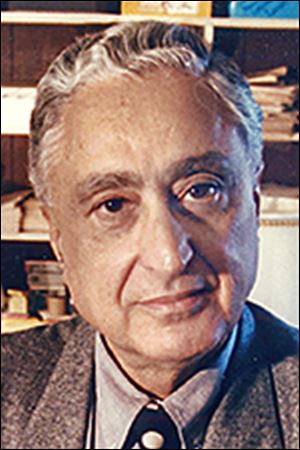
Abid A. Al-Marayati; 1931-2013: UT professor renowned scholar of Middle East
8/4/2013
Al-Marayati
Abid A. Al-Marayati, a University of Toledo political science faculty member for nearly 45 years and a former department chairman who had been director of the university’s International Studies Center, died on Monday in the UT Medical Center, the former Medical College of Ohio Hospital. He was 81.
He had chronic obstructive pulmonary disease.
“Even through all the health issues, he had this passion for teaching and constantly had people over at the house and talking about teaching and topics of interest to him, especially concerning the Middle East and political science,” his son Waleed said. “That was his passion. That was his life.”
Over a distinguished career, Mr. Al-Marayati had been named a UT outstanding teacher and, for his work toward improved international relations, received the Golden Door Award from the International Institute of Greater Toledo. He’d been active in local Arab-American groups and was a director of the World Association of Former United Nations Interns and Fellows. He had been a consultant for international relations to the Group for the Advancement of Psychiatry.
A native of Iraq, Mr. Al-Marayati was a renowned scholar on the Middle East and wrote or edited several books and was the author of many articles and papers.
“Throughout his career, he traveled extensively to professional conferences,” said David Wilson, a professor emeritus and a longtime colleague in UT’s department of political science and public administration. “He kept professionally active, delivering papers and participating in panel discussions and involved himself extensively in the local community.”
His knowledge, scholarship, and background — in the 1950s and 1960s, he was secretary to the Iraqi and Yemeni delegations to the U.N. — “that was the foundation of his academic and teaching career,” Mr. Wilson said. “He could be very interesting, and he could be quite charming.”
He taught courses in international law, international relations in the Middle East, and on the U.N. He was called on to offer perspective for local news accounts of world events — Israeli-Palestinian conflicts or peace attempts, the death of Ayatollah Ruhollah Khomeini, U.S. wars in Iraq, the execution of Saddam Hussein. Invariably, he ended phone conversations with a hearty “Many thanks!” and “All the best!”
He was in the news most frequently, though, for his protracted efforts since the early 1990s to continue teaching at UT against attempts by the university to fire him. He had been critical of the administration. The university said he hadn’t responded satisfactorily to student complaints about his teaching. He charged in federal court and in discrimination complaints with civil rights agencies that the university was motivated by his Iraqi heritage and Muslim beliefs.
The costs were personal and financial. He told The Blade in 1994, relatively early in his struggle, that he’d spent $100,000.
“His relationships with his colleagues and with the administration became increasingly complicated and difficult,” Mr. Wilson said.
Mr. Al-Marayati's son, as he studied for a master’s degree, took public administration courses taught by his father’s colleagues.
“Those who loved him spoke with great admiration,” his son said. “He was very opinionated and very strong and would tell you exactly what was on his mind.”
The professor did not consider backing down.
“That’s how he was his whole life,” his son said. “When he felt something was right, no matter the topic, he was going to defend it to the end.”
Mr. Al-Marayati was a professor emeritus and continued to teach, although his classes became more occasional in recent years. In May, UT ended his status — and a long letter of protest he wrote to President Lloyd Jacobs was posted to an arts-and-sciences college blog. Among personnel matters approved by UT trustees at their June meeting was an item listing his name and “separation from employment, discharge for cause, superannuate,” spokesman Meghan Cunningham said.
Mr. Al-Marayati’s son said: “It’s very unfortunate, a sad situation where he served the university over 40 years. He could easily have walked away at any point and said, ‘Enough is enough.’ Up to the very end, he said, ‘Absolutely not.’ He wanted to teach and educate people on various issues.”
He was born Oct. 14, 1931, in Baghdad, the son of a candymaker, the eldest of 13. By age 17, he was a leader in protests against British occupation. As the police response grew violent, his grandparents sent him to the United States. He received a bachelor’s and master's degrees from Bradley University in Peoria, Ill. He received a doctorate from New York University.
After his years at the U.N., he taught at Arizona State University, was a Harvard University research fellow, and was an assistant at the International Atomic Energy Agency in Vienna.
He was a Shiite Muslim and did not return to his homeland because of Saddam Hussein’s Baath Party. In northwest Ohio and southeast Michigan, he attended several mosques, both Shiite and Sunni, including the Islamic Center of Greater Toledo.
“He wanted to make it clear he was Muslim first," his son said.
Surviving are his sons Ghazi and Waleed Almarayati; brothers Hussein, Amer, Sabih, Farouk, Waleed, Abdul Fateh, and Tariq Al-Marayati; sisters Medina, Suead, and Najat, and a grandson.
Services were Friday at the Islamic Institute of Knowledge in Dearborn, Mich. Burial is to be in Najaf, Iraq, son Waleed said.
The family suggests tributes to the Islamic Institute of Knowledge.
Contact Mark Zaborney at: mzaborney@theblade.com or 419-724-6182.